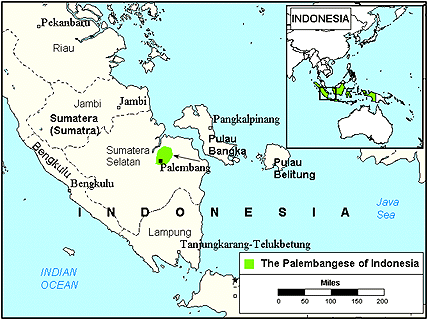The Palembangese are divided into two groups: the Wong Jeroo and the Wong Jabo. The Wong Jeroo are the descendants of royalty and lesser heroes of the ancient kingdoms that were centered in Palembang. The Wong Jabo are the commoners.
There is some indication that the Palembang are the descendants of Javanese and Chinese kingdom administrators, although the Chinese identity is not readily admitted. One acknowledged expert on the Palembang, himself a descendant of kings, states that his people are the result of a melting pot effect that occurred along the banks of Sumatra's Musi River years ago. Over the centuries Arabs, Asian Indians, Chinese, Javanese, and other Indonesian ethnic groups blended into one group called the Palembang. They have a high unemployment rate in Sumatra, Indonesia and a small number have managed to live and work in nearby Singapore.
Palembang families are patriarchal (ruled by the father). The wife's responsibility is to maintain the order and harmony of the home so that the husband can say, "My home is my heaven." Families greatly desire male children. The grandparents on both sides of the family consider a grandson's birth to be a strengthening of their power and a guarantee of the continuation of their line of descendants.
The majority of the Palembang are Muslim. Tradition plays a central role in their society. In their daily lives, they hold to the belief that "tradition is to be held in one's lap, and Islamic law is to be held in high esteem." They are also exposed to the Buddhism and secularism prevalent in Singapore. The Palembang do not currently have a complete Bible in their language, and there are few, if any, followers of Christ among them.
There is a sense of spiritual oppression among the Palembang. Many of them feel destined to a hopeless existence. They need to hear the truth about the one God who alone has the power to save them.
Pray for the Lord to provide for the Palembang's physical and spiritual needs and that they will understand this as an example of God's grace and mercy.
Pray for the Lord to thrust out workers to the Palembang people.
Pray that they will have a thirst for the water of life that only Jesus can provide.
Pray for a movement to Christ that cannot be stopped.
Scripture Prayers for the Palembang in Singapore.
| Profile Source: Joshua Project |











